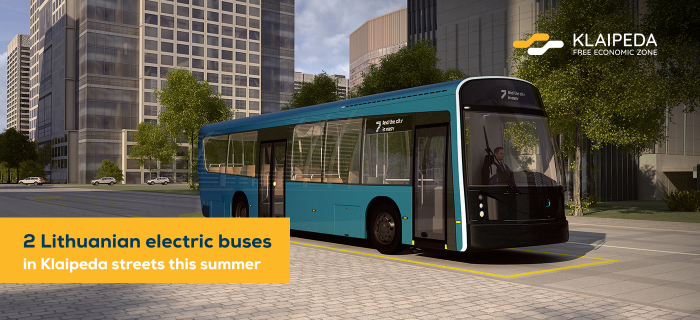News & Events
Watch our activity in one place
Lithuanian Electric Buses to Hit the Roads by the End of Summer

At the end of summer, the first two Lithuanian electric buses Dancer should start operating in Klaipeda. Vejo projektai, the company that makes them, is almost done building them, while the Klaipeda Bus Park is waiting for the financing, which is planned to get alotted this month, Verslo zinios reports.
The Klaipeda City Council is scheduled to discuss a project, which would increase the share capital of the Klaipeda Bus Park by 665,000 EUR at the end of May. The company is planning to spend this money on two Dancer electric buses.
The Klaipeda Bus Park and Vejo projektai signed a contract for the acquisition of the two buses in February 2018. The Klaipeda Municipality also transferred an advance worth 5% of the value of the whole contract, 35,000 EUR, but failed to dedicate the money to cover the rest of the costs.
The Klaipeda Bus Park share capital increase project documentation states that the company will pay 350,000 EUR (without VAT) for each of the two Dancer buses. This price is similar to the ones asked by other electric bus manufacturers. For example, the Vilnius Municipality paid the Turkish bus manufacturer Karsan Otomotic Sanayii ve Ticaret A.S. 1,5 million EUR for 5 smaller electric buses.
First registered electric bus
Alvydas Naujekas, the CEO and shareholder of Vejo projektai, told Verslo zinios that both electric buses are nearing the end of the manufacturing process and could be seen in the streets of Klaipeda by the end of the summer. Both passenger vehicles have been certified, one of them has been already registered at Regitra. By the way, it was the first M3 class electric bus registered in Lithuania.
Vejo projektai has settled in at the Klaipeda Free Economic Zone-owned FlexStart flexible manufacturing plant for now; however, the company has started building a dedicated factory nearby and hopes to move there by the end of the year. 7 million EUR is expected to go towards building the first stage of the factory.
“Both buses are being put together right now, but they are almost finished, there’s barely anything left to do, if at all. We have a great space, a bit smaller than optimal but the foundation of our own factory has been laid,” says P. Naujėkas.
A couple of years ago, while talking to Verslo zinios, the businessman talked about dreams of building 500 Dancer buses a year; however, he speaks about building tens of them now.
“We are building something like a manufacturing laboratory right now, not a straight up factory. That’s where we will be able to carry out manufacturing experiments. So far, we’re talking about tens of buses, not hundreds,” says P. Naujėkas.
A. Naujėkas asserts that, “While entrepreneurs always have lofty ambitions, a bird in the hand is worth two in the bush.”
“Reality showed us that we need to form a manufacturing components cluster, which is what we are successfully doing in Lithuania. We moved some processes to Lithuania from Denmark, the Netherlands, Germany. Our partners started organizing the manufacturing of parts in Lithuania, not only in the Klaipeda FEZ but the entire country as well – composites, metal constructions, car wiring manufacturing, all of it is being done throughout Lithuania. Still, attempts to make windows in Lithuania were unsuccessful. Despite that, quite a lot of components are being made in Lithuania,” says P. Naujėkas.
Among the Vejo projektai suppliers, there is Devold AMT, a glass fiber manufacturer from Kursenai, Yazaki Wiring Technologies Lietuva, which makes electric wiring systems.
There is no competition so far
Mr. Naujėkas says that it’s hard to speak about competition in the electric bus manufacturing business because neither the small or big manufacturers have started mass production.
“Except for the Chinese. Despite that, the Chinese manufacturers are busy trying to meet domestic demand so far, I expect that that is still going to be the case 3-4 years from now until they will start thinking about exporting their buses. The first to start exporting their buses to Europe will be the big manufacturers, which have their buses built in China, like Volvo and VDL. Even then, however, a couple of years will have to pass before this could become a serious concern,” predicts the CEO of Vejo projektai.
According to P. Naujėkas, the market is still dominated by diesel buses; however, there is a strong trend of the biggest European cities cutting down on their usage, choosing gas hybrids instead, while eyeing the evolution of electric buses.
“So, we cannot see any competition happening because the demand is huge while the supply is almost zero. This is the best time to start mass production. Throughout the year, we will be trying to launch a series of buses. I cannot say exactly how many buses will be in the series right now, though,” says P. Naujėkas.
